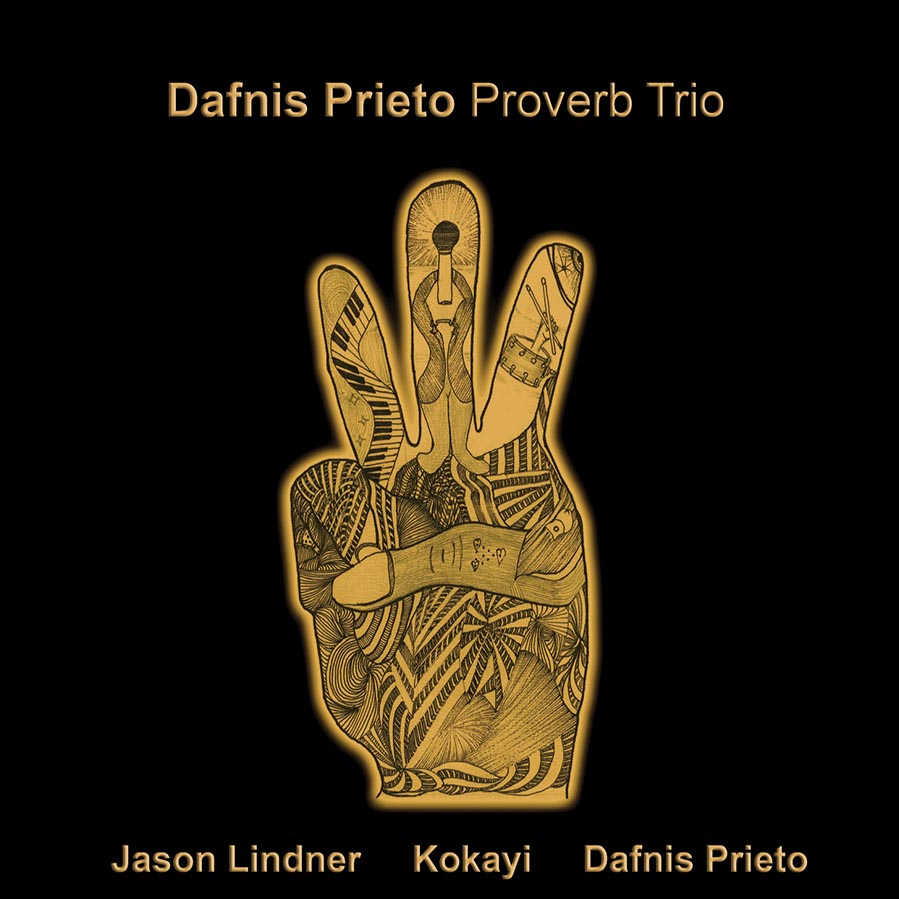DAFNIS PRIETO PROVERB TRIO
Dafnis Prieto, Drums / Kokayi, Vocals / Jason Lindner, Keyboards
“Everything was improvised,” says Dafnis Prieto. “We did the entire album in six hours.”
He’s speaking about DAFNIS PRIETO PROVERB TRIO, the eponymous album that’s about to be released on Prieto’s label Dafnison Music. The group made its debut in 2009 at the Whitney Museum in New York, but this is their first album, recorded after more than two years of improvising in front of live audiences in both the US and Europe — and it’s the first album Prieto has made since being awarded a MacArthur Fellowship (the “genius grant”) in 2011.
Combining Kokayi’s freestyle poetry encompassing song, rapping, and vocal percussion, Dafnis Prieto’s explosive drumming, and Jason Lindner’s rhythmically intense electronic keyboards, the DAFNIS PRIETO PROVERB TRIO attempts to bring the refinement of composition to the action of collaborative improvisation. Each of Prieto's five albums as a leader has been radically different, with a different instrumentation around his drums and a different set of challenges for the players. On this one, “we’re creating songs,” he says – not sprawling jams, but concise structures and infectious grooves created collectively, on the fly, around a poetry that is as improvised as the instrumental parts.
Recorded on January 28, 2012, the DAFNIS PRIETO PROVERB TRIO captures a moment in the lives of three musicians with extraordinary abilities. On another day, they would have played different rhythms, different words, different harmonies, different structures.
* * *
When Drumhead magazine called Dafnis Prieto “a revolutionary drummer as well as a visionary composer and bandleader,” the choice of adjectives was spot on: Prieto is not merely a hyper-proficient, voraciously knowledgeable player, though he is that. He’s a breathtakingly original composer, who brings new ideas of how his drummer’s knowledge can transform ensemble composition into something that hasn’t been achieved before. Part of his compositional power is his ability to improvise – or, as he prefers to think of it, “spontaneous composition.”
When he came to New York in 1999, Dafnis Prieto was already a veteran professional, having first traveled to Europe on tour at the age of 16. A product of Cuba’s renowned system of music education, he first attracted attention in New York for his skills as a phenomenal drummer, becoming a first-call collaborator for the city’s most exacting and creative musicians: a short list would include Eddie Palmieri, Henry Threadgill, Steve Coleman, Chico and Arturo O’Farrill, Michel Camilo, Brian Lynch, Don Byron, Fort Apache, and on and on, including a memorable, minimally rehearsed 2003 quartet stand supporting the visiting Chucho Valdés at the Village Vanguard. At the same time, he began to create a now extensive repertoire of compositions, receiving an impressive list of commissions. He was, and remains, a vital force in a brilliant generation of Cuban emigré musicians who have over the last fifteen years or so transformed musical life in New York.
Meanwhile, working constantly with musicians from many different paths, Dafnis Prieto forged networks of cross-cultural musical alliances, a process that extends back to his life in Cuba. His friendship with Washington, D.C.-born vocalist Kokayi reaches back to “’95 or ’96,” when Prieto was still living in Havana; Kokayi came to the embargoed island for a project with his mentor, saxophonist Steve Coleman, whose forward-looking mid-90s collaborations with Cuban musicians formed a critical point of contact with New York jazz. “Kokayi is coming from the hip hop movement and from freestyle improvising,” says Prieto, “but also from working creatively with Steve Coleman, which is a very demanding gig for improvising on top of complex forms.”
Prieto and Kokayi first performed as a duo in 2004 at the Saalfelden Jazz Festival in Austria; for subsequent gigs they brought in special guests to round out a trio, including Steve Coleman and Henry Threadgill. But they “felt the need for a third player” on a regular basis, says Prieto. He’d met Brooklyn native Jason Lindner in 1999, when Prieto first came to New York after a year and a half in Barcelona, and “we started playing together in many bands,” including Lindner’s own big band. A keyboardist with strong rhythm and an ear for electronic nuance, Jason Lindner grew up listening to hip-hop, and played with a wide range of jazz and pop artists (Lauryn Hill, Roy Hargrove, Meshell Ndegeocello, among many others) including Prieto’s Absolute Quintet, with whom he recorded the much-praised Absolute Quintet album in 2005 (Dafnison Music). In the Proverb Trio, Lindner has an enormous space to play in, connecting the drums with the voice while directing the flow of harmony — and, on some numbers, playing duo with Prieto while Kokayi lays out. “I always felt connected with Jason,” Prieto says. “There’s an empathy we have while playing.”
The music the three make together travels through a wide range of genres, but it’s all a single personalized flow of musical communication. “It's the consequence of my experience and their experience of the way we listen,” says Prieto, “a home made of the way we live now.”
A few highlights from the many places the album goes: “The Magic Danzonete” (cut #3) finds Kokayi going from vocal percussion to a blues-brag about a “magic man” while Prieto plays the bass line of Abelardo Valdés’s 1937 danzón standard “Almendra” on the toms and Lindner elaborates on the singer’s embryonic funk melody, which in turn becomes a platform for a drum solo before Kokayi returns to vocal percussion, all in four and a half minutes. “You Got It” (#5) is “an homage to the New Orleans second line,” says Prieto, “that linkage between New Orleans and Cuba.” “In War” (#6) “is a tune that starts with Jason’s keyboards, kind of baroque, and then it goes to on different journeys within the tune — goes to a rock kind of aggressive vibe and then a swing vibe and then it disappears the way it came in, with that feeling of baroque canon.” “Mother Nature” (#12), the album’s closer, has a 6/8 “afro-andino” feel, in multiple layers of live rhythm, finishing with a melodic solo by Lindner.
But you don’t have to know any of that to feel the music. This band can communicate with a wide variety of audiences. After the complexities of his previous notated music, says Prieto, “I'm trying to do something simpler so that we can invite more people to participate in our joy.” Spontaneous composition becomes spontaneous combustion: “We’ve played it for people sitting down, but when we play for people who are standing up, they dance, they scream, they have a great time.”
ALBUM
VIDEOS
Dafnis Prieto Proverb Trio EPK
Dafnis Prieto Proverb Trio: You and Me
Dafnis Prieto Proverb Trio: The Magic Danzonete
Dafnis Prieto Proverb Trio: Vamos a Jugar
Dafnis Prieto Proverb Trio: Dirty Us


